This post will be talking about the state of law on HBO’s Game of Thrones. Plot points from the first six seasons will be discussed, so if you have an iron-clad policy against spoilers and you are not caught up with your watching, let this serve as the legal disclaimer.

Polliver: I’M SORRY! I didn’t mean to spoil you about how the Sixth Sense ends!
Arya: You and Bruce Willis are about to have something in common…
The fantasy land of Westeros appears to be quite a lawless place, with frequent occurrences of treachery, backstabbing, unpunished kinslaying, robbery, murder, etc. At the very least it’s a violent place, but even though there doesn’t seem to be much adherence to the rule of law, laws are in evidence. Sometimes in unexpected ways.
I have some observations on that, which I hope will be entertaining. Full disclosure: I’m not a legal scholar, historian, or a stand-up comedian.
Most, but not all, of this article will be following Arya Stark’s journey through Westeros during the first four seasons.
Arya on Trial in the Riverlands
The first legal matter presented on the show happens in the second episode of the first season, the Kingsroad, where Arya is brought before King Robert Baratheon to account for Joffrey being attacked by her direwolf Nymeria. It doesn’t look good for Arya.
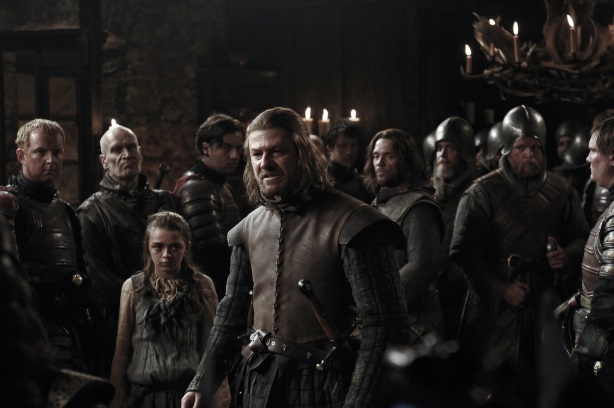
My two favorite Stark tertiaries, Jory Cassel and Fat Tom (directly behind Ned) are ready to Kick Lannister Ass.
Our adorable wolf-girl’s case is particularly difficult because she fled the scene, which caused Mycah the butcher’s boy to flee as well.
Westeros is not medieval England (let’s pretend it’s similar socially) but in the approximately analogous time in English history, fleeing justice was an easy way to be branded an outlaw. Being an outlaw in England did not have the same sexy connotations that might apply to train robbers in the old West. Being an outlaw meant being someone who could not expect any legal protections and therefore could be killed by anyone who cared to do so, without the killer having to face repercussions. The dangers inherent in being declared an outlaw was to incentivize people not to flee, and to follow customary practices to settle the dispute or make recompense.
If a similar precedent is in Westeros, that might explain why the Hound rode Mycah down rather than taking the time to capture him.
Arya was fortunate in being of noble birth and the Hand’s daughter, and was brought to the king for a hearing rather than a foregone conclusion and punishment. Because Sansa could not/would not corroborate Arya’s claims, the king opted to let the matter drop in the hopes of the conflict being considered settled. But Cersei demanded recompense (a direwolf’s life, even if the direwolf on hand was innocent.)
The core of English law is it is better a matter be well settled than settled well 1, which somewhat describes the outcome as adjudicated by King Robert. The result seemed to appease the aggrieved party (Cersei, at least) if not necessarily being just.
Justice can be elusive in these cases, and from the king’s perspective things might have seemed to have worked out just fine (since things could have gone far worse for Arya.)
King Robert: So that’s that then. It’s well settled! But my stomach’s not. Time for second dinner!
So although the matter was not settled well, a relatively fair process preceded the punishment.
This seems typical of how legal matters are probably dealt with across Westeros. The local lord is a quasi-judicial figure for their subjects and are expected to rule on disputes. Those involved must not attempt to flee justice, or risk legal protections being stripped away off-hand.
This is reinforced when Ned Stark, acting as Hand of the King, commands Tywin Lannister to report to the court to account for the accusations of Lannister men (notably Gregor Clegane and cronies) breaking the King’s Peace and ravaging in the Riverlands.
This is kind of undercut by Jaime Lannister fleeing King’s Landing after ambushing Ned and his men. Cersei maintained the Jaime was not at fault under the allegation that Ned had attacked Jaime, but that’s ridiculous. Jaime’s flight was proof enough of his implicit guilt. But in this case, unfortunately for justice, King Robert was not inclined to prosecute his brother-in-law.
(There’s another example that casts some shade on my flight == outlaw rule of thumb. We’ll get to that a bit in a moment.)
Arya in the Riverlands: Swords != Laws. Or aren’t they?
Arya’s bad trip south through the Riverlands was nothing compared to her bad trip north, starting in the second season. With Joffrey in power, there was a push to eliminate all of Robert’s illegitimate children. The party of Night’s Watch recruits that Arya was traveling with was approached by some goldcloaks from King’s Landing who were hunting for Gendry, the young blacksmith who was undoubtedly one of Robert’s bastards, and known to be so by the Lannisters.
Goldcloak: I have a royal warrant for one of the gutter rats you’re transporting.
Yoren: The thing is, these gutter rats belong to the Night’s Watch now. That puts them beyond the reach of kings and queens.
Goldcloak: Does it?
*Goldcloak draws a sword, Yoren already has a dagger at the man’s femoral artery.*
I’ve always liked how the exchange was described in the books:
The goldcloaks retreat without Gendy, after threatening to return with more men.
Both Arya and Yoren remark that the goldcloaks are far from home, implying that the party is well into the Riverlands and not still in the Crownlands that border King’s Landing (where officers of the city would have more jurisdiction.) Regardless of their geographical situation, Yoren makes the case that Gendry, as a recruit of the Night’s Watch, should have legal protections from arrest. (If he did something awful while in Night’s Watch custody, Yoren was probably authorized to hang him on the spot or whatever.)
It’s established that what crimes a man has done is washed away when they take the black, and one can assume that there’s a grace period while they are a prospective recruit and bound for the Wall.
But as Cersei said earlier in that season, Power is Power. The goldcloaks felt they could push the boundaries of their authority through the intimidation of violence but Yoren was already ahead of that tactic.
If we take the swords out of the equation, it’s still an interesting question of who is right in the situation. The royal warrant seems to be an out-of-the-ordinary legal instrument, and Gendry’s Night’s Watch protections might not guarantee him immunity from such. This appears to be a legal question that’s above the pay-grade of both Yoren and the officer trying to serve the warrant.
The goldcloaks are far from King’s Landing, but Yoren and the party are far from the Wall. In other times, it might have been required for the regional lord to hear both sides. (The fact that the goldcloak-in-charge went looking for men instead of suggesting legal counsel implies he felt his argument would not have held up.)
I’ve seen comments online chastising Yoren for just not killing the goldcloaks to prevent them from seeking reinforcements. I’ve never quite understood that viewpoint. In 20/20 hindsight, murdering those guys, who were just doing their job, might have saved the Night’s Watch party from being taken by Ser Amory Lorch so quickly, but the disappearance of royal officers sent to track a group bound for the Wall would not go unnoticed. At some point, the party would have been intercepted, and one of those recruits would have ratted Yoren out. And rightfully so. Yoren had no just call or legal grounds to rashly murder those guys.
Unless he murdered them and then took the bodies directly to the nearest lord’s keep to explain the situation. Which is not what Yoren wanted to do either.
Okay, I mentioned that I wasn’t necessarily convinced that a fugitive on the run could be killed out of hand without penalty, and Yoren is my example. Yoren tells Arya a story that a young (handsome) man named Willem killed Yoren’s brother, and fled. At some point, possibly years later, Willem rode back to the village and Yoren killed him with an axe, took his horse, and rode straight to the Wall to enlist.
If things in Westeros were as I suggested, Yoren might have been in his rights to kill Willem in reprisal for the death of Yoren’s brother, if it was understood or agreed on that Willem had done the crime. (Willem fleeing is an admission of guilt.) If so, then Yoren would have had no need to rush to the Wall to surrender to them in lifelong service to avoid prosecution.
But it’s hard to rule either way. We don’t know the details. Was Willem the son of a nobleman or other powerful person, and therefore would manage to avoid prosecution? Did Willem flee to avoid being killed by Yoren’s family, confessed to the crime in safety and paid some kind of wergild to balance things? Did Yoren just assume he’d be in trouble for killing Willem?
It does seem like murder is either completely unpunished, or murderers opt to take the black to avoid being killed themselves.
Regardless, killing the officers would not do well for the reputation of the Night’s Watch recruiters, and the Night’s Watch was already in a steady decline. It would be too risky for Yoren to kill the goldcloaks, without cause, and the dispute had not escalated. (Yet.)
If in other times the dispute between the goldcloaks and the recruitment party might have been talked over with a 3rd party, why did things escalate to threats of violence so quickly? Or why didn’t the goldcloak-in-charge just recognize Yoren’s invocation of Night’s Watch legal precendents?
It was kind of a chaotic time. With King Robert dying, Joffrey taking the throne, and the Lannisters initiating various purges, a certain amount of realpolitik was in play where the framework of civil law was recognizably weakened in order to get results done.
At this time though, Arya did encounter someone who took laws very seriously. Just not the typical laws of Westeros.
Three of the party members bound for the Wall as Night’s Watch recruits were dangerous enough that they were traveling in a caged wagon. (I assume that’s the case. Maybe they paid extra to ride to the Wall, rather than walking. And the lock was there to keep all the lower class recruits from hopping in.)
When Amory Lorch’s Lannister troops attacked Yoren’s group, a fire broke out near the wagon. Rather than letting the caged men perish, Arya gave them an axe with which they procured their escape.
Later, one of the men named Jaqen H’ghar explains to Arya that since she saved him and his two companions, there was a debt to be paid. Arya must name three names, and they would die to offset the three lives that otherwise would have died.
H’ghar is pretty invested in following these rules. Arya would not have compelled him to keep the bargain had he not told her about it first. And later on, when Arya chose Jaqen H’ghar as her third name to demand more than he had been willing to offer as planned, he agreed to her terms.
It’s like Jaqen is a guy waiting for a long red light to turn green, on a deserted road, in the middle of nowhere, with no other cars around and no police to ticket him. Sure, it would be illegal for him to run the red light, but there would be no reasonable repercussions and everyone would understand why he’d do that. But he patiently follows the rules for that light to turn green.
We don’t really know why. We don’t even know if it’s a Faceless Man thing, or part of the role that the Faceless Man is playing when he’s being “Jaqen H’ghar.” But he certainly seems to be a rules-follower.
Arya in the Riverlands: Laws and Outlaws
Soon after, Arya is taken captive by the Brotherhood without Banners. Their status makes for an interesting legal discussion.
Before this group of fighting men became the Brotherhood, they were a task force sent under royal orders (via authority invested in Ned Stark, the current Hand of the Kings) to interdict the lawless rampaging of Ser Gregor Clegane. But the political power shifted with a coup (more or less) in King’s Landing, and suddenly they were being hunted by Gregor Clegane who had the resources of a Lannister army and royal blessings from the new King Joffrey.
It’s possible that their leader, Beric Dondarrion, could have attempted to arrange something like a pardon. I mean, they had been acting under legal authorities in the Riverlands during the changeover in monarchs. It’s doubtful that Tywin would have allowed that, since Beric’s men included House Stark fighters, although if it had worked out, Tywin would have been free to focus fully on Robb Stark.
Dondarrion’s forces could be considered a guerilla force potentially working on behalf of the Baratheon with the best claim to the Iron Throne, Stannis Baratheon. I mean, Stannis had a red priestess and was in theory backed by the Lord of Light… Beric had a red priest and was being resurrected (possibly) by the power of the Lord of Light. Dondarrion is from the Stormlands, and therefore should be a Baratheon vassal.
But the Brotherhood seemed to be quite comfortable acting without any legal authority, and they were not really behaving like law-breaking outlaws. On the contrary, they were trying to uphold the law in some ways. Their respect for due process (okay, honorable trial by combat) kept Sandor Clegane alive.
The Brotherhood were outlaws as far as the crown was concerned: outside the protections of law. It’s a crime to provide aid to such men, which provided the thin justification needed by the Lannisters to act barbarously whenever they felt like it.
When the Lannisters transitioned from being marauders in the Riverlands to being peacekeepers under royal authorities, probably many people were falsely accused of being Brotherhood supporters and dealt with harshly, without any kind of fair process.
Eventually, Arya caught up with one of those peacekeepers that she’d encountered before…
Nice Looking Chickens – It’d be a shame if the Hound ate them all…
Free from the Brotherhood without Banners but with few safe havens to head for, the Hound and Arya came across a tavern infested with Lannister men who were abusing their privilege as King’s Men, allegedly keeping the peace in the formerly rebellious Riverlands province. One of those Lannisters was Polliver, whom Arya had last met when as part of Ser Amory Lorch’s forces that killed her Night’s Watch comrades and detained her at Harrenhal.
Arya essentially forced the Hound into conflict with these officers of the law, and in the process got revenge for Lommy Greenhands and reclaimed Needle, her rapier that was given to her by Jon Snow.
When this scene happened, one of my favorite podcasters was very concerned about Arya’s story going so dark, and how the musical cues for the scene suggested that the show wanted us to approve of this anti-social behavior from Arya. Her dark journey and the show’s use of music as audience influencers are worthwhile things to discuss but not really relevant to this legal-focused article, but the phrase “anti-social” certainly is. I take issue with the wording in Arya’s context.
For her actions to be anti-social, there has to be a society for which her behavior would be frowned upon. Normally that would be the case in Westeros. Arya getting a revenge-kill on Polliver as a reprisal is an example of why there are laws against murder, and also traditions to mediate or prevent this kind of dispute from getting so far out of hand.
But this wasn’t normal times.
Polliver and Arya were both operating in an environment where the conventional laws had been put aside, not only thanks to the war in the Riverlands and the harsh violence and brutality being used to crush out resistance, but also due to the lack of safeguards on the behavior of the peacekeepers who should be, you know, keeping the peace. Equitably and with justice.
I’m not saying Arya is justified in murder and revenge, but it just seems appropriate in some ways. In her current surroundings, she has no other legal option to pursue redress. Like Harvey Keitel in City of Industry, she’s her own police.
And Arya is fine with using needle to leave the matter well settled. (And maybe this is settling the matter well also?)
Proof, Justice, and the Feudal Way
I’ve been suggesting that the lawlessness and breakdown of order in the Riverlands is atypical in Westeros. But is it? Couldn’t it be the case that it’s like this all the time? The feudal times are synonymous with might makes right and suck it peasants, yes? Errr… not really. Sure, knights were typically entitled and murderous pains in the ass, and peasantry wasn’t the most secure occupation, but typically the feudal system was a step up from loose and unchecked strongman-rule.
Lords and vassals had obligations and responsibilities that went both ways. That brought a lot of stability when things were actually working. Okay, I’ve kind of snuck back into talking about Medieval England again and not Westeros, so let’s see if I can derive some proof from the show.
We don’t get a lot of time in Westeros outside of King’s Landing, the North, or the Riverlands. We kind of bounce into Dorne and back, as well as the Eyrie. We took a brief peek in the Reach with Sam Tarly. Everything seemed relatively stable in those places. (Well, maybe not so much in Dorne.)
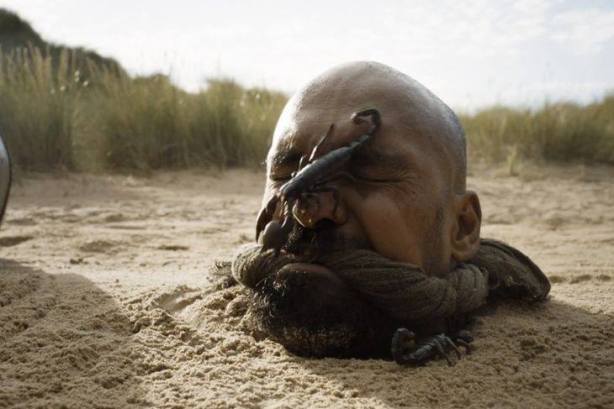
Captain: I am being denied due process!
Obara: We did say that if you could not afford a bucket of scorpions, one would be provided for you.
But in the Riverlands, the farmer who briefly sheltered Arya and the Hound (before Clegane robbed him) made it clear that things used to be more stable and secure in the area, when the Tullys were in charge.
But that’s not really all that interesting. I think everyone assumes that things were stable and law-abiding during peacetime, mostly. Do we have any extraordinary examples from the show of the inherent rule of law, other than “things used to be better?”
We do.
Up North, in Season 5 we viewers got to see a lovely heart-to-heart between the men of House Bolton, Roose and newly-legitimized Ramsay. Ramsay was feeling a bit nervous about his standing, now that Roose Junior was on the way thanks to Roose’s new bride Walda.
To reassure him, Lord Bolton told his son a charming tale of how he met Ramsay’s mother. A tale of rape and potential infanticide.

Roose: You see, my boy, when a man loves a woman very much, it’s a wonderful thing. And then I come along and hang him.
Ramsay: Go on.
Roose had taken Ramsay’s mother by force, with her newly-wed husband swinging by his neck from a rope nearby. This miller (the dead husband) had gotten married without notifying Lord Bolton and apparently there’s an old law or custom in the Dreadfort environs that if the lord so chose, he got the right of the first night with the bride. The young miss in question was rather attractive, Roose felt it within his rights to have his way with the young bride and hang the miller for not giving him first dibs.
This is not the example of rule of law that I’m talking about. Please bear with me.
Some time later, the widow showed up with baby Ramsay and demanded the equivalent of child support. In the episode where this is recounted, Roose told Ramsay that he’d considered tossing the infant into the moat and having the mother whipped, but instead he did his paternal duty and acknowledged Ramsay as his bastard. (In hindsight, maybe it would have been to everyone’s advantage, even Roose’s, had he gone with his initial instinct of drowning the baby.)
The extraordinary thing to me, in regards to the legal observances, was not that Roose Bolton did right by Ramsay. It was that Ramsay’s mother felt safe enough to go to court in the Dreadfort and make any kind of demands at all from Roose “Flayed Man” Bolton, and have a reasonable expectation of a positive outcome.
If justice (or at least legal recompense) can be accomplished in the Dreadfort court without a reliance on violence… that’s proof of social order.
Okay, I think I’ve gone on long enough about laws and lawlessness in Westeros. Mostly from Arya’s point of view. It’s not necessarily as entertaining a topic as I usually try to pitch. (Had I chosen Tyrion and his constant trials and legal woes, maybe I could have rolled in more jokes. Possibly involving a brothel, a donkey, and a honeycomb. Maybe I’ll have a Law and Order: Tyrion post one day.)
Hopefully it was interesting enough. Feel free to tell me either way.
Special thanks to the wonderful and formidable Carol Pinchefsky, writer for Blastr and Geek and Sundry, for requesting I write a post on this very topic. Carol, I hope this article didn’t put you to sleep.
(Comments are always welcome. Super welcome! But if you want to talk spoilery Game of Thrones talk with me (also welcome) I’d invite you to visit my Safe Spoilers page on my backup blog. That way my non-book-reading friends won’t be shocked with foreknowledge.)
Most images from HBO’s Game of Thrones (obviously.)
Comic panel featuring the Hound and dead Mycah from Dynamite Entertainment’s A Game of Thrones monthly comic book.
I make no claims to the artwork, but some claims to the text. Well, not to the text on the image that has the encounter between Yoren and the Goldcloak. That’s from an Arya chapter in A Clash of Kings.
1 I heard the details about “it is better a matter be well settled than settled well” on the Secret Masters Podcast, which was discussing matters of succession in the context of Realpolitik and Game of Thrones. I’ve tried to corroborate the citation, but “well settled law” is an incredibly common phrase among law blog posts and ZZZZZZZZZZZzzzzzzzzzzzzzzzzzzz
If you liked this article, thank you! I have all of my Game of Thrones related articles on my handy-dandy Game of Thrones page should you want to read more but don’t want to navigate around my site.
© Patrick Sponaugle 2016 Some Rights Reserved

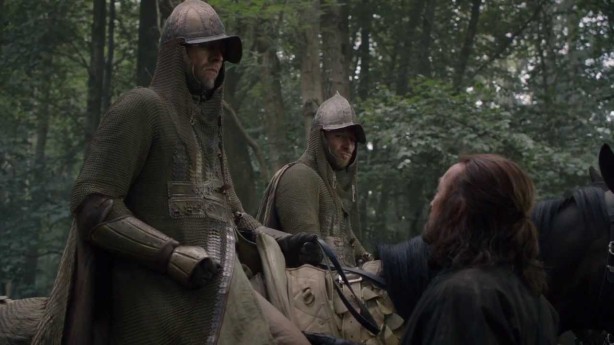



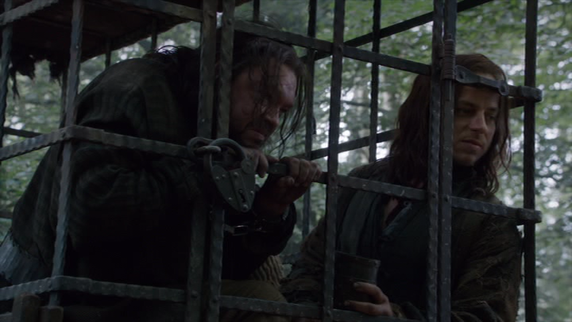



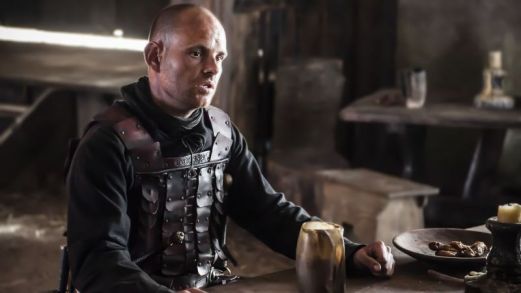
Well done, as always! Wonderful examination!
Minor nit-pick:
“and one can assume that there’s a grace period while they are a prospective recruit and bound for the Wall.”
I feel like that’s not quite so — otherwise people would be ‘taking the Black’ all over the place, walking around a corner and going back to their life. I would imagine they don’t enjoy the Wall’s protection until they’ve actually spoken the oath.
Man, I miss Yoren. That guy was awesome. We need another Yoren but who doesn’t die.
*waves at Jaqen*
“Hey boyyy, heyyyyyy…. “
LikeLiked by 1 person
I mean people being escorted to the Wall are effectively under the Night’s Watch legal status, even if they haven’t yet taken the vows. If someone commits a crime, announces they’re going to take the black to avoid punishment and then goes back to farming, they’re clearly not taking the black.
I probably could have been clearer about what I meant…
LikeLiked by 1 person
I was in a hurry earlier, I meant to thank you for your appreciation of Yoren. I loved that guy. I first saw him in a British kids mystery on Nickelodeon (watching it with my daughter) called House of Anubis. One of the actors was was Lancel Lannister.
ANYWAY, yeah, I wished Yoren was still around. Fantastic guy, got Arya out of King’s Landing. You go, Yoren. You go!
LikeLiked by 1 person
Oh, gotcha! No worries!
And — Lancel Lannister in something else? WEIRD. I am picturing him being the love interest in some of these dozens of YA sci-fi dystopian movies that keep coming out. He’ll do great whatever he does, but I’ll miss him on GoT! 😀
LikeLiked by 1 person
Very interesting look at the laws and justice of Westeros. Admittedly, the show takes place during a rather chaotic time, so perhaps laws are given a lot more flexibility than they were in the past. I think most interesting is the idea that fleeing the scene of the crime nullifies any protection under the law. I suppose it seems logical to assume one would not flee unless they had something to hide.
LikeLike
Thanks. A lot of this is just kind of guesswork on my part, and seeing how things have been done in other settings.
LikeLike
It was late last night when I finally read the full post and couldn’t think of anything clever to say. That said, brain cells don’t seem to improve much in daylight hours 🙂
I have an impression that laws favour the ruling classes, not the plebs, since, for the most, they’re the ones making the laws and dishing the punishment. Westeros is particularly lop-sided in this matter. Lords wield the power, picking and choosing whether to accuse, condemn or overlook depending on allegiances.
Amory Lorch slaughtered Rhaenys Targaryen, a mere 3 year old. There was no accusation, trial or consequence for his actions because the order came from Tywin, a lord above all lords.
The finer details of whether or not he had jurisdiction over the Night’s Watch and prospective Night’s Watchmen seems by the bye. He served the Lannisters. The Lannisters place themselves above the law when it suits them, enforce the law when it suits them and twist the law when it suits them.
Cersei blinded a servant girl for stealing – both were eleven. Were there any consequences for her? If it had happened the other way round, it’s highly likely the girl would’ve been executed.
During Tyrion’s trial, his defence was more or less muzzled. Witnesses for the defence were intimidated or bribed as lie after lie spread out on the table, truths were ignored and facts fabricated. Tyrion was not provided with legal defence and only allowed to ask one question. All because it suited Tywin. Tyrion was a second class citizen, a pleb, to be dealt with at the ruling lord’s pleasure.
Medieval England, from which GRR Martin draws much of the inspiration for his books, seemed to operate under similar premises, albeit less chaotic. Yes there were many laws, but it depended on the lord if they were well settled or settled well.
The only true defenders of law, justice and honour are the Starks, Tullys, Mormonts and the Brotherhood Without Banners. The latter, although outside the law according to the self-serving incumbent power, do their best to uphold a nobility of ideals in accordance to the law as it should be. And Arya dispensed the law when the system failed her.
Maybe if they had Twitter it wouldn’t be so hard.
LikeLiked by 1 person